Intel is in the process of releasing their new Haswell architecture next week at Computex. Luckily, we were able to find an Intel Core i7-4770 retail boxed product for sale on Amazon.com this week. Since this was a retail purchased product and not a sampled product under NDA / press embargo, this does not qualify as a leak. Just a first benchmark of the chip prior to the official release. Like the Ivy Bridge processors prior, Haswell is utilizing Intel’s 22nm tri-gate process technology. This go-round Intel has implemented much of the power circuitry previously found on motherboards now on-die. As one can see from the various “leaks” of motherboard pictures, Haswell socket LGA1150 motherboards have significantly fewer power related components surrounding the processor socket. The Intel Core i7-4770 is a 4 core 8 thread (thanks to Hyper-Threading) processor.
Test Configuration
At ServeTheHome we do honor NDAs and media embargos so we are not going into great detail regarding which motherboard we are using. We will be doing several LGA1150 motherboard reviews in the next few weeks all from various vendors. We are also using our older previous Windows test suite for this review.
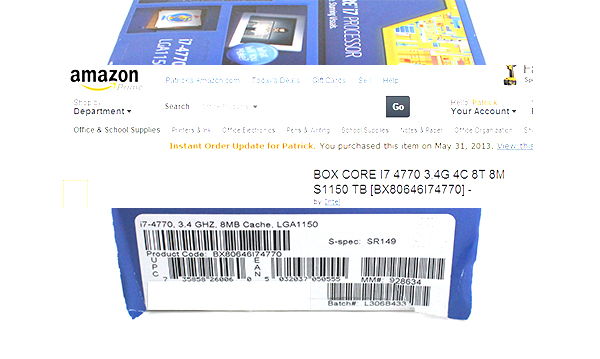
Other major details in the test configuration:
- Memory: Kingston 16GB DDR3 1600MHz (non-ECC)
- SSD: Samsung 840 Pro 256GB SSD
- Power Supply: PicoPSU 150XT with 150w power supply
- Operating System: Windows 7 Enterprise
This should be sufficient for a basic build. More on LGA1150 motherboards this week.
Intel Core i7-4770 Performance Tests
I will start off this section by saying that the standard test suite was built to test 1-8 thread single CPU systems. Examples are Sandy Bridge and Ivy Bridge Intel Xeon CPUs. Over time, we have been slowly altering the mix. Clearly, one would expect a different workload between dual Intel Xeon E5-2690 CPUs and something found in a low-end, low-power server like an Intel Pentium G2120. Moving to the 16-64 core realm where the AMD Opterons and Intel Xeon E5 CPUs dominate, we utilize our Linux test suite which will be the standard going forward. In the coming days we will update those results with a more robust set of processors to compare to.
Cinebench R11.5
We have been using Cinebench benchmarks for years. Cinebench has been added to the test suite because it does represent a valuable benchmark of multi-threaded performance. We have had quite a few readers contact me about this type of performance for rendering performance. Cinebench R11.5 is something that anyone can run on their Windows machines to get a relative idea of performance. After seeing Cinebench scale from one to 64 cores, it has become a favorite.

As we can see with the Cinebench results, the new Haswell architecture performs very well. Easily outpacing the Ivy Bridge generation parts.
7-Zip Compression Benchmark
7-Zip is an immensely popular compression application with an easy to use benchmark. It is also part of our Linux benchmark suite.

7-Zip benchmark results have the Intel Core i7-4770 at just about the same level as the Intel Core i7-3770K. This is really showing off the IPC benefits of Haswell.
TrueCrypt Encryption Benchmarks
With Intel’s focus on its AES-NI features TrueCrypt can look a bit skewed. Unlike some dubious drivers over the years that were optimized for benchmarks over real world application, Intel’s AES-NI feature does encompass the addition of specialized hardware. This specialized hardware has many practical uses. For example, users of Solaris 11 can utilize the AES-NI features to see much higher throughput on encrypted volumes. AMD has started offering AES acceleration on many of its so it is a good test for most CPUs now. At the same time, modern processors are so fast that AES encryption is more or less “free” at any practical wire speeds.

Here we see some very interesting results. The Intel Core i7-4770 is almost as fast as dual AMD Opteron 4736HE processors and significantly faster than the Ivy Bridge generation. Here is a quick example of what a typical benchmark run looks like on the Intel Core i7-4770:
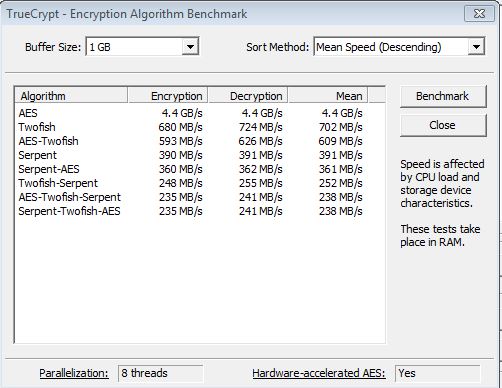
Strong performance all around.
Handbrake 0.9.5 x264 Encoding Benchmarks
We are still using Handbrake v0.9.5. This is just to keep a consistent look at CPUs that have been tested with v0.9.5. We will begin to collect data on v0.9.6 and start using that once we have critical mass. Either way, Handbrake is an extremely popular x264 encoding and transcoding application. It is very common practice these days to encode video for mobile devices. Quick transcoding is an important CPU application.
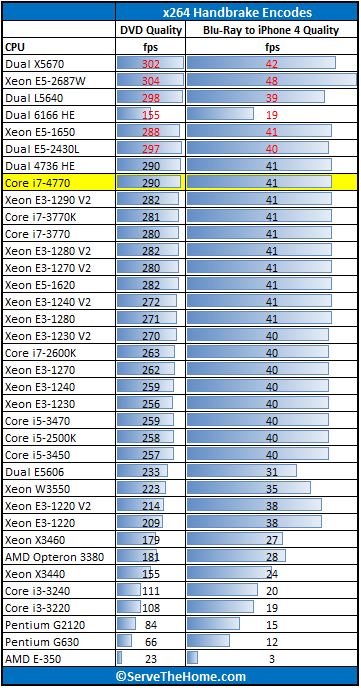
Given the filters we are using, this is exactly what we would expect. The Intel Core i7-4770 is hitting the limits of the particular benchmark setup. Again, this is a benchmark started in the LGA1156 days when there was actually a significant difference in CPU performance given the test profile.
Power Consumption
Power consumption is a top concern for hardware manufacturers. We test using an Extech 380803 True RMS power analyzer. It is a really nice unit that even records usage over time.
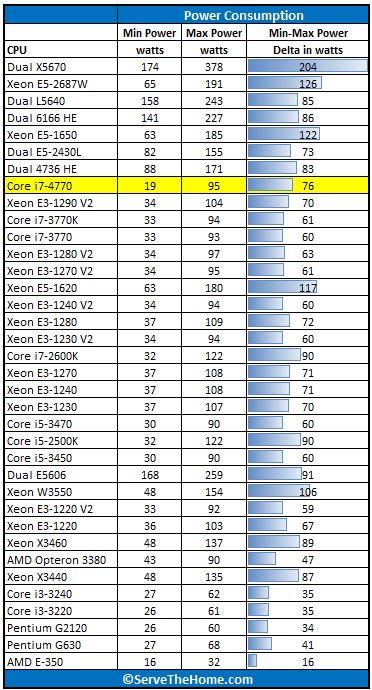
This certainly shows Haswell is doing well but not that much better than previous generation CPUs. Especially in terms of idle power consumption. Of course, faster speeds mean workloads are done faster and more time at idle. On the other hand, this was not a major breakthrough on the desktop. On the mobile side, the reduction in on-board power components and idle power consumption is a big deal. The Intel Core i7-4770 is a solid performer in terms of speed and power consumption. Since the Intel Xeon E3-1200 V3 series will share this architecture, a sub-20w idle architecture is a major breakthrough for racks of servers. We will see more on this in the coming days.
Conclusion
Overall, Haswell does provide a nice IPC bump as compared to Ivy Bridge. The big question at this point is, what about the Intel Core i7-4770 versus older hardware? If one has an Intel Core i7-2600K or Intel Core i7-3770K this is probably not a worthwhile upgrade. There is a new chipset and socket involved. For that matter, if one is looking to upgrade a Sandy Bridge generation computer, used Ivy Bridge processors may be a better value at this point. At best, the Intel HD 4600 graphics are a slight upgrade over what Ivy Bridge had and processor speeds are again a slight upgrade. For those users with socket LGA1156 parts, Haswell may indeed be a solid upgrade option. The inclusion of technology like VT-d, TSX and etc in the Intel Core i7-4770 versus the Intel Core i7-4770K may make it a solid choice for many users that do not overclock. Generally, the non-K parts are a bit less expensive so if features and cost savings are more important than overclocking (3.4GHz is also very fast) then the Intel Core i7-4770 is a better buy.
One area to investigate is how the higher TDP parts impact power consumption. On one hand, there are fewer components. On the other hand, the higher TDP Haswell chips need to be actively cooled. That means that some of the benefit may be negated by increased fan speed if the heat needs to be dissipated by the CPU fan versus passively cooled VRM stages. Consider that a follow up. Of course, more in store this week with Haswell, the Intel Core i7-4770 and Intel Xeon E3-1200 V3 processors. Stay tuned!


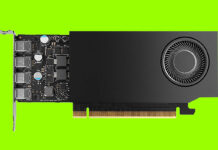
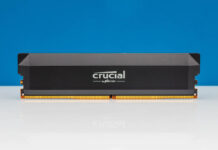
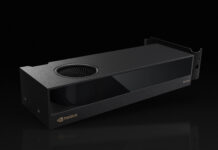
Nice to see someone without the K version. At these speeds I want vpro management over overclocking
Very nice article. You did well job back then, I am reading it retro, cause i could upgrade from socket 775 last 10 years.